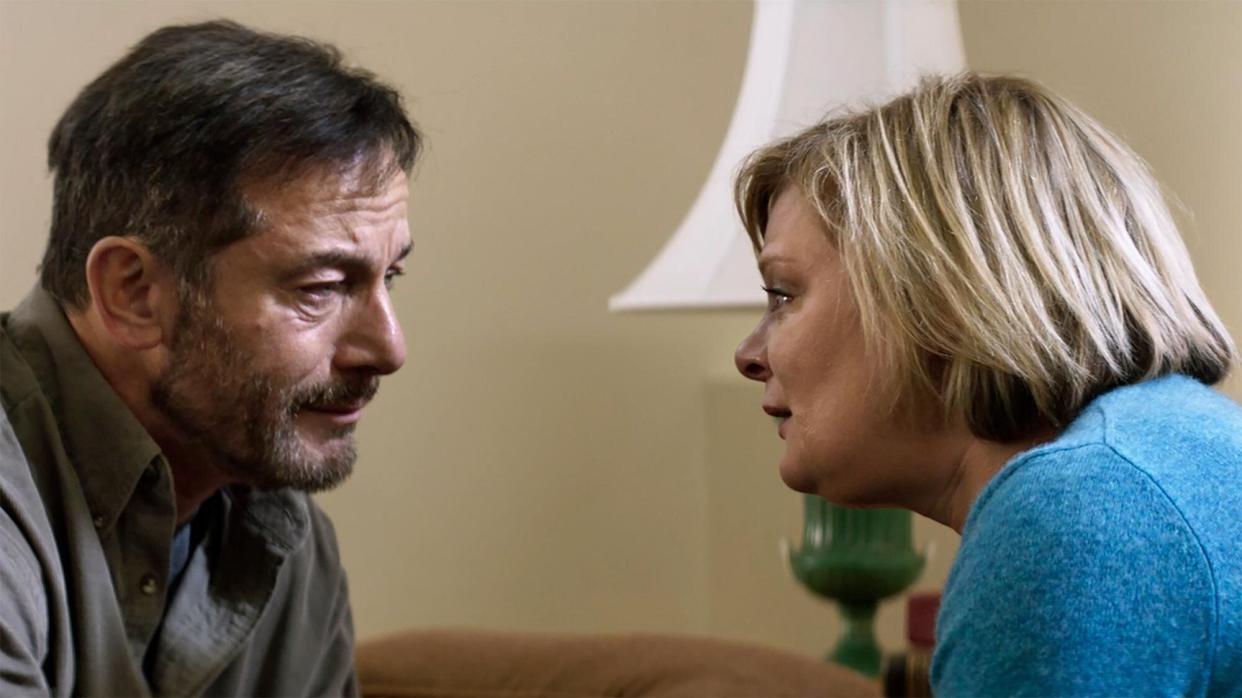Mass review: Chamber-piece drama bracingly showcases a remarkable cast

- Oops!Something went wrong.Please try again later.
Ryan Jackson-Healy/Sundance Institute
This review was originally published in January out of the Sundance Film Festival. Mass opened in theaters Oct. 8 and expands to wide release on Oct. 29.
Hollywood doesn't make a lot of movies about school shootings, maybe because it's one of the last things Americans want to talk about. That makes almost every moment in Mass a painful experience — so much so that even writer-director Fran Kranz comes at the subject sideways, not outright acknowledging his story's purpose till nearly a third of the way through his feature debut, which premiered Friday at the Sundance Film Festival.
That augurs a slow, ambiguous start for Mass, which lingers in an Episcopalian church that reads like any other small-town house of worship: modest brick exterior, industrial carpet and wooden crosses in the common spaces, piano cords floating down the hallway. An anxious minister's wife (Breeda Wool) fusses and flutters around a meeting room, while a much calmer woman in office-wear (Michelle N. Carter) directs her.
This will be neutral space, we soon learn, for some kind of summit between two couples: Jay (Jason Isaacs) and Gail (Martha Plimpton) are jumpy and reluctant, not even sure they want to be there; Richard (Reed Birney) and Linda (Ann Dowd), when they sit down, seem equally wary. The small talk is awkward and circular and overly polite.
It's not till the 35-minute mark, after strained discussions of snails and travel plans, that Gail finally articulates, incredulously, why they're all there: "Why do I want to know about your son? Because he killed mine." What follows is a sort of staggered emotional bloodletting, as each character in turn attempts not just to articulate their lingering pain and rage and disbelief, but also assign or deflect blame.
Kranz is best known as an actor in movies like The Cabin in the Woods and on Broadway (Death of a Salesman, You Can't Take It With You), and Mass feels very much like theater, not only in its chamber-piece staging but in the mannered rhythms and grand speechifying paragraphs of his script. (It's technically shot like one too; there are no flashbacks or framing devices, aside from a few mostly wordless exterior scenes.)
But there's also raw power in his story — and the remarkable talents of his veteran cast: Isaacs' furious Jay, desperate to find logic in studies and brain science; Birney's self-contained Richard, who uses his calm businessman mien as a sort of battering ram; Dowd as Linda, a moony suburban earth-mother type who couldn't be less like her Emmy-winning turn as the gleeful fascist Aunt Lydia on The Handmaid's Tale. And Plimpton's raw-nerved Gail, who speaks the least but holds the screen every time she does.
They bend and reshape Kranz's stagier cadences, finding the bruises and soft spots to press on as the details of what happened — even secondhand, they're devastating — are reconstructed from their collective memories. Blame is shifted and denied and reassigned, though the bare facts remain the same: both their children are gone, and nothing that happens in this room will change that.
It won't likely change the national conversation around gun violence either; not much so far seems capable of doing that. But Mass, as maddening as it can be, still feels like an urgent and necessary movie, if not at all an easy one — and an exceptional opportunity too to watch four great character actors, finally called up from the sidelines to center stage, do what they do. Grade: B
Related content:

